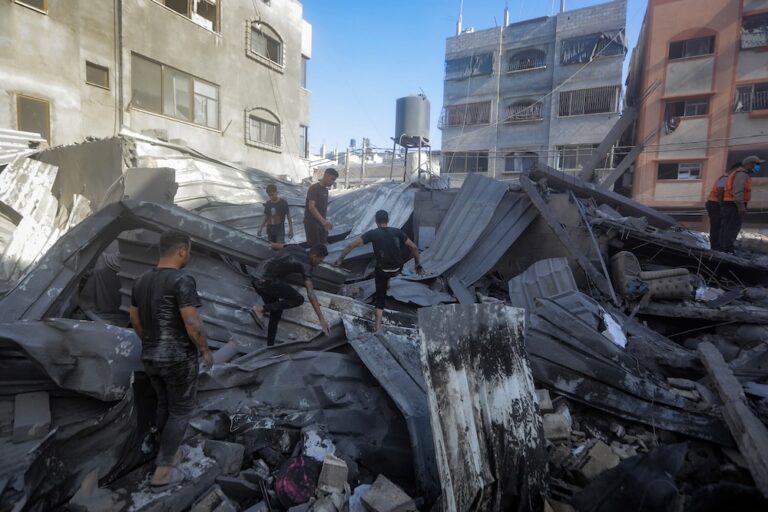(IPI/IFEX) – The following is a 25 July 2001 IPI press release: Vienna, 25 July, 2001 IPI Updates Report on Israeli-Palestinian Conflict and Calls for Independent Monitoring The International Press Institute (IPI), the global network of editors and media executives, has updated and revised its report on press freedom violations related to the Palestinian Intifada. […]
(IPI/IFEX) – The following is a 25 July 2001 IPI press release:
Vienna, 25 July, 2001
IPI Updates Report on Israeli-Palestinian Conflict and Calls for Independent Monitoring
The International Press Institute (IPI), the global network of editors and media executives, has updated and revised its report on press freedom violations related to the Palestinian Intifada. Covering the period from the beginning of the uprising on 29 September, 2000 until 24 July, 2001, the report provides a detailed examination of the serious abuses of journalists and media outlets in the Occupied Palestinian Territories and Israel.
Journalists in the Occupied Palestinian Territories are carrying out their duties under extremely dangerous conditions. As of 24 July 2001, a total of 102 press freedom violations have been recorded by IPI, 87% of which were perpetrated by Israelis (76% by the authorities, including the Israeli Defence Force, and 10% by Israeli settlers. One additional per cent was carried out jointly by these two groups). The remaining 13% were carried out by Palestinians.
The Israeli authorities have promised to investigate several of these cases following protests from different journalist groups and press freedom organisations. However, there has not been any prosecution of perpetrators. Indeed, to IPI’s knowledge there has only been a single case of an Israeli soldier being reprimanded for shooting a journalist.
Israeli authorities appear to be trying to prevent negative media coverage of the clashes because of the crucial role the media play in influencing public opinion around the world. The Palestinian authorities, on the other hand, who are behind 8% of the violations, seem to be oversensitive to media criticism of their form of government. Palestinian civilians are responsible for 3% of press freedom violations and Palestinian paramilitaries for the remaining 2%.
Out of the 102 incidents recorded by IPI, there were two deaths. The director of the Palestinian Wafa news agency’s Bethlehem office, Azez Al-Teneh, died from injuries sustained in an explosion, the causes of which are still unclear. Hisham Mekki, the general head of the official Palestinian broadcasting stations, was assassinated by a Palestinian paramilitary group. The violations included 43 incidents of journalists being shot. All but one of these shootings were probably carried out by Israeli armed forces. There were also 42 incidents of journalists being physically assaulted or harassed. Four broadcasting stations were effectively censored (due to shutdown by order of the authorities or because of missile attacks), at least two journalists were seriously threatened, three were denied entry into Israel from the West Bank and all Palestinian journalists were denied Israeli press cards and thus severely obstructed in carrying out their profession.
IPI Director Johann P. Fritz said, “The IPI supports the international community’s calls for outside monitors of the Israeli-Palestinian conflict and stresses the importance of ensuring that the monitors are independent. The main concern of the monitors should be the gathering of unbiased information on the violations of fundamental human rights, including press freedom.” He added, “It is in everybody’s interest that the world be given objective and full accounts of the unfolding events in the tragic conflict taking place in the Occupied Territories, the Palestinian Authority Territories and Israel.”
In the conclusion of the report, IPI recommends that the Israeli Judiciary conduct investigations into the press freedom violations committed by the Israeli authorities and that the results of the investigations be made public. Israeli security forces should review their guidelines concerning the protection of journalists; in particular, neither journalists nor media outlets should ever be military targets. Furthermore, the Palestinian authorities should end their arbitrary detention and intimidation of journalists and should refrain from closing or censoring media outlets. IPI also urges the Palestinian Judiciary to conduct independent investigations into these press freedom violations.
The International Press Institute is a non-governmental organisation with members in over 110 countries, including Israel and the Palestinian Territories.
Read IPI’s Report: www.freemedia.at/r_Isr-Pa.23.07.01.htm


